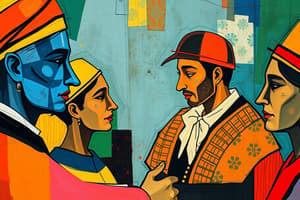Podcast
Questions and Answers
How do deviations from cultural norms typically result in societal reactions?
How do deviations from cultural norms typically result in societal reactions?
- Disapproval, censure, or exclusion (correct)
- Celebration and acceptance
- Indifference and neutrality
- Approval and encouragement
What is the primary function of cultural norms within a group or community?
What is the primary function of cultural norms within a group or community?
- Encouraging rebellion against societal rules
- Preserving individual uniqueness
- Guiding behavior and interactions (correct)
- Promoting isolation and exclusion
What insight does the provided text offer regarding cultural norms?
What insight does the provided text offer regarding cultural norms?
- Cultural norms have no impact on societal interactions
- Different cultures have unique norms (correct)
- Cultural norms remain static over time
- Norms are consistent across all cultures
How do cultural norms influence individual thinking, feeling, and acting?
How do cultural norms influence individual thinking, feeling, and acting?
Which of the following factors contribute to the change in cultural norms over generations?
Which of the following factors contribute to the change in cultural norms over generations?
Why is it crucial to understand the impact of cultural norms on societal interactions and governance?
Why is it crucial to understand the impact of cultural norms on societal interactions and governance?
What role do cultural norms play in shaping personal self-concept?
What role do cultural norms play in shaping personal self-concept?
In collectivist societies, what is prioritized?
In collectivist societies, what is prioritized?
How do cultural norms affect legislative decisions?
How do cultural norms affect legislative decisions?
Which of the following best describes the impact of cultural norms on conflict resolution?
Which of the following best describes the impact of cultural norms on conflict resolution?
What is a key characteristic of Confucianism regarding hierarchies and obligations?
What is a key characteristic of Confucianism regarding hierarchies and obligations?
How do shared cultural norms impact immigrant integration into host communities?
How do shared cultural norms impact immigrant integration into host communities?
Flashcards are hidden until you start studying
Study Notes
Exploring Culture, Society, and Politics: Cultural Norms' Influence
Culture, society, and politics intertwine in shaping our daily lives through the lens of shared values, beliefs, and practices. One particularly prominent component within these realms is cultural norms. These unwritten rules guide behavior, communication, and even political dynamics across various societies. To delve deeper into understanding this intricate relationship, let's begin by examining how culture affects norms and their impact on societal interactions and governance.
Understanding Cultural Norms
Cultural norms encompass expectations about appropriate behaviors, attitudes, customs, and traditions within a group or community, guiding individual thinking, feeling, and acting towards achieving social cohesion. They evolve over time and often remain implicit; however, deviations from such norms can lead to disapproval, censure, or exclusion. This framework provides us with three fundamental insights:
-
Norms vary: Different cultures embrace distinct standards regarding dress codes, manners, communicational styles, and so forth. Consequently, what is deemed acceptable or desirable in one place might not hold true elsewhere.
-
Norms change: Due to dynamic socioeconomic factors like globalization, migration, technology, and climate change, cultural norms alter over generations. However, the pace of transformation varies significantly based on local history, religious beliefs, and geographic location.
-
Norms shape identity: As individuals internalize particular norms, they become an integral part of personal self-concept. Moreover, conformity to cultural norms helps reinforce group membership, fostering collective solidarity and identification.
The Interaction between Cultural Norms & Social Behavior
As already mentioned, cultural norms form a crucial foundation for social interaction patterns, influencing everything from family structure and childrearing methods to group decision-making processes. For example, collectivist societies prioritize group harmony and consensus building whereas individualistic cultures emphasize personal autonomy and choice making. Similarly, Confucianism, a Chinese philosophical tradition, promotes respecting hierarchies and fulfilling obligations toward superiors, while Western democracy upholds individual rights, equality before the law, and citizen participation.
Moreover, social movements frequently build upon cultural norms to challenge existing power structures, advocating for systemic changes in both societal and governmental spheres. Societies with strong feminist movements illustrate this process well – gender roles are renegotiated in light of new cultural values promoting equal opportunities and fairer treatment of women.
Political Implications of Cultural Norms
Cultural norms also influence political dynamics and policies, serving as significant drivers of both domestic and international affairs. Some notable examples include:
-
Legislative decisions: Legislators tend to base policy proposals on national values and corresponding social ideals. For instance, countries with deeply rooted Christian values may prohibit abortion due to their belief in the sanctity of life.
-
Conflict resolution: Certain cultural norms encourage peacebuilding strategies that reconcile differences without resorting to violence, thereby reducing conflict levels. An example could be efforts aimed at resolving ethnic tensions caused by deep-rooted historical animosities.
-
Migration and integration: Shared cultural norms facilitate smooth adjustment procedures for immigrants, enabling them to integrate seamlessly into host communities. However, when values diverge, conflicts may emerge, necessitating sensitive mediation efforts to prevent potential clashes.
In brief, cultural norms exert profound effects on human thought, behavior, and relationships, playing essential roles in determining societal interactions and shaping political landscapes. By critically evaluating contemporary trends, we gain insight into complex issues, fostering mutual understanding and cross-cultural cooperation amidst increasing global interconnectedness.
Studying That Suits You
Use AI to generate personalized quizzes and flashcards to suit your learning preferences.




